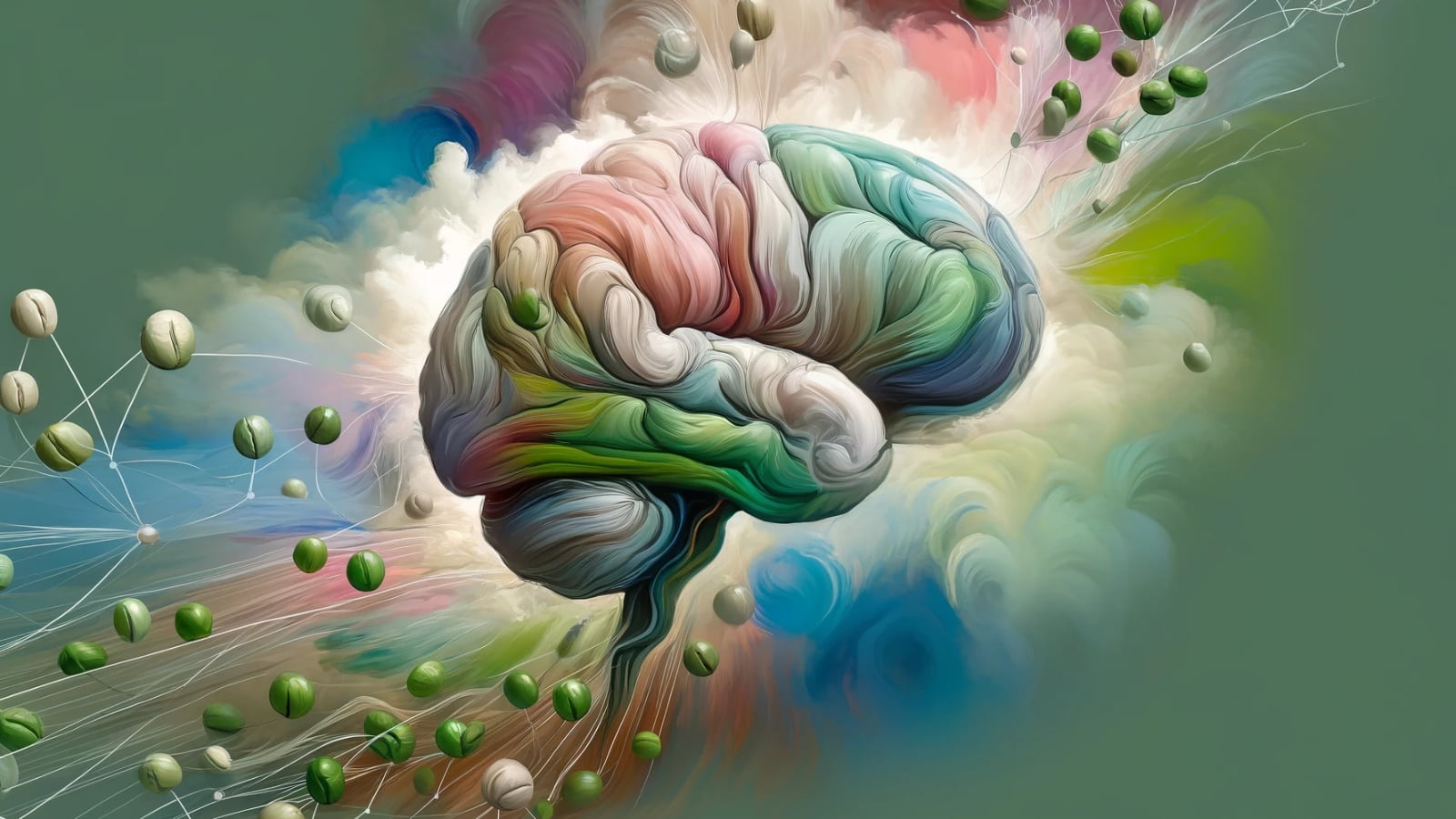
Green coffee bean extract (GCBE) has almost twice the amount of cognition-enhancing compounds compared to roasted coffee beans.
It offers cognitive benefits like improved memory, focus, and neuroprotection. GCBE supports cardiovascular health and glucose metabolism, which also contribute to better brain health.
Its effects stem from increasing BDNF levels, modulating neuroinflammation, and enhancing cerebral blood flow.
While generally safe, GCBE may cause side effects in some individuals and interact with certain medications.
Table of Contents
What is Green Coffee Bean Extract?
Green coffee beans are the raw pits of coffee berries from the Coffea arabica and Coffea canephora (robusta) plants.

Unlike regular coffee, which undergoes a roasting process that reduces the levels of beneficial compounds, green coffee beans retain high concentrations of chlorogenic acids. These compounds are potent antioxidants known for their health benefits.
Green coffee bean extract (GCBE) is widely used in dietary supplements for weight management benefits. It also relieves inflammation, helping prevent or treat several chronic diseases.
Additionally, green coffee bean extract is known for its nootropic effects. It enhances cognitive function by improving focus, alertness, and overall brain health.
How Does Green Coffee Bean Extract Differ from Regular Roasted Coffee?
Green coffee bean extract preserves the natural composition of the raw coffee beans.
According to a study, the roasting process can reduce chlorogenic acid content by up to 90%.(1)
This means that green coffee bean extract provides a more concentrated source of this beneficial compound, along with other antioxidants and polyphenols that may be diminished during the roasting process.
See the table with active compound concentrations.
| Active Compound | Green Coffee Bean Extract | Roasted Regular Coffee |
|---|---|---|
| Chlorogenic Acid | 34-41% by weight | 10-20% by weight |
| Caffeine | 1-2% by weight | 3-5% by weight |
| Quinic Acid | 3-5% by weight | Trace amounts |
Notice that green coffee bean extract contains less caffeine than roasted coffee, providing a milder stimulant effect without the jitters commonly associated with high caffeine intake.
This makes it suitable for individuals seeking a natural, less intense boost in energy and mental clarity.
How Does Green Coffee Bean Extract Work as a Nootropic?
Green coffee bean extract contains several active ingredients that support brain health through various mechanisms.
This is what makes it a valuable nootropic for boosting mental performance, protecting neurons, and improving overall cognitive function.
What Are the Key Ingredients in Green Coffee Bean Extract?
The primary active ingredients in green coffee bean extract are:
- Chlorogenic acid: A potent polyphenol antioxidant and a neuroprotectant
- Caffeic acid: Provides antioxidant and anti-inflammatory effects that protect brain cells
- Quinic acid: Promotes neuroprotection and supports brain health
- Trigonelline: An alkaloid found in green coffee beans that may have neuroprotective properties
- Caffeine: A stimulant that boosts mental performance
What Are the Mechanisms Behind Its Cognitive Benefits?
Green coffee bean extract’s nootropic effects are primarily mediated by chlorogenic acid and its various mechanisms of action. It has been shown to:
- Increase brain-derived neurotrophic factor (BDNF) levels: BDNF is a protein that supports the growth, differentiation, and survival of neurons, playing a crucial role in learning, memory, and brain health.
- Modulate neuroinflammation: It has anti-inflammatory properties that help protect the brain from oxidative stress and inflammation-related damage.
- Enhance insulin sensitivity and glucose metabolism: By improving the body’s ability to regulate blood sugar levels, the extract supports optimal brain function and energy production.
- Interact with adenosine receptors: Chlorogenic acid modulates the activity of adenosine, a neuromodulator involved in sleep, arousal, and overall mental well-being.
- Enhance cerebral blood flow: It improves blood flow to the brain, ensuring optimal delivery of oxygen and nutrients to support cognitive function.
By supporting these various aspects of brain health, green coffee bean extract may offer both short-term cognitive benefits and long-term neuroprotective effects.
What are the Cognitive and Health Benefits of Green Coffee Bean Extract?
Green coffee bean extract provides a range of cognitive and health benefits. It enhances memory, learning, focus, and concentration while also offering neuroprotective effects.

Additionally, GCBE supports weight loss, cardiovascular health, and glucose metabolism, making it a comprehensive supplement for overall well-being.
How Do Green Coffee Beans Enhance Memory and Learning?
Green coffee bean extract has shown potential in enhancing memory and learning, primarily due to its high chlorogenic acid content.
One specific mechanism by which GCBE enhances memory is through the modulation of brain-derived neurotrophic factor (BDNF). BDNF is vital for neurogenesis, synaptic plasticity, and overall cognitive function.
A study published in the Journal of Nutritional Neuroscience found that rats treated with GCBE showed a significant increase in BDNF levels, leading to improved memory performance in maze tests.(2)
Additionally, chlorogenic acid inhibits the enzyme acetylcholinesterase, which breaks down acetylcholine, a neurotransmitter essential for learning and memory.
A human study observed that individuals who consumed GCBE for 12 weeks showed enhanced cognitive performance, including better memory recall and learning abilities.(3)
Can Green Coffee Bean Extract Improve Focus and Concentration?
Green coffee bean extract has shown promise in improving focus and concentration, due to its moderate caffeine levels.
Chlorogenic acids in GCBE inhibit the enzyme glucose-6-phosphatase, which helps regulate blood sugar levels, providing a steady energy supply to the brain.
One study found that participants who consumed green coffee bean extract exhibited better focus and attention spans. The study noted a 15% increase in attention and a 10% improvement in task performance among the participants.(4)
Additionally, the caffeine content in green coffee bean extract enhances alertness and concentration by blocking adenosine receptors in the brain, which promotes wakefulness and reduces fatigue.
Does Green Coffee Bean Extract Have Neuroprotective Effects?
Green coffee bean extract is recognized for its neuroprotective effects.
One of the significant mechanisms is its potent antioxidant activity, which helps in reducing oxidative stress—a key factor in neurodegenerative diseases.
A study published in the Journal of Nutritional Biochemistry found that chlorogenic acid can mitigate neuronal damage by scavenging free radicals and upregulating antioxidant defenses.(5)
Furthermore, GCBE has anti-inflammatory properties, which are crucial in protecting neurons from chronic inflammation, often observed in neurodegenerative conditions.
Research shows that GCBE reduces inflammatory markers, such as TNF-α and IL-6 in the brain, demonstrating its ability to lower neuroinflammation.(6)
Additionally, GCBE influences mitochondrial function, which is vital for neuronal health. It helps in maintaining cellular energy balance and preventing neuronal apoptosis.
What Are the Other Health Benefits of Green Coffee Bean Extract?
Green coffee bean extract offers several health benefits beyond cognitive enhancement.
- Weight loss: GCBE aids in weight loss by inhibiting fat accumulation and boosting metabolism.
- Supports cardiovascular health: GCBE supports cardiovascular health by reducing blood pressure and improving cholesterol levels. A study found that chlorogenic acid in GCBE significantly lowered blood pressure in hypertensive patients.(7)
- Improves metabolism: GCBE improves glucose metabolism and insulin sensitivity, making it beneficial for managing type 2 diabetes.
How to Use Green Coffee Bean Extract for Cognitive Enhancement?
When choosing a green coffee bean extract supplement, look for products that contain at least 45-50% chlorogenic acid, as this is the primary active compound responsible for its cognitive and health benefits.

For maximum efficacy, follow the safety guidelines:
- Start with a lower dose and gradually increase as needed, while monitoring your body’s response
- Monitor for side effects and adjust your intake accordingly
- Consult a healthcare professional before starting GCBE, especially if you have pre-existing health conditions or are on medication
- Be cautious when combining with other supplements
What is the Recommended Dosage of Green Coffee Bean Extract?
Most studies have used doses ranging from 400-800mg per day, typically divided into two or three smaller doses.
However, the recommended dosage of green coffee bean extract varies depending on the specific product and its chlorogenic acid concentration.
How Long Does it Take for Green Coffee Bean Extract to Work?
The time it takes for green coffee bean extract to work can vary depending on individual factors such as age, weight, metabolism, and overall health status.
The mild stimulant effects of green coffee bean extract can be felt within 30-60 minutes of consumption, providing a relatively quick boost in alertness, focus, and concentration.
However, the more sustained cognitive benefits, such as improved memory and learning, may take several weeks of consistent use to become noticeable.
Can Green Coffee Bean Extract be Combined with Other Nootropics or Supplements?
Yes, green coffee bean extract can be combined with other nootropics and supplements to enhance cognitive performance and overall health.
Some nootropics and supplements that may complement the effects of green coffee bean extract include:
- L-theanine: This amino acid, found naturally in green tea, can help counteract the jittery effects of caffeine while promoting relaxation and focus.
- Bacopa monnieri: This herb has been used in Ayurvedic medicine for centuries to support memory, learning, and overall cognitive function.
- Omega-3 fatty acids: These essential fatty acids, particularly EPA and DHA, are crucial for brain health and function.
- Rhodiola rosea: This adaptogenic herb has been shown to reduce fatigue, improve mental performance, and support stress resilience.
- B-vitamins: B-vitamins, such as B6, B9 (folate), and B12, play essential roles in brain function, energy metabolism, and neurotransmitter synthesis.
Are There Any Side Effects or Precautions with Green Coffee Bean Extract?
While green coffee bean extract is generally considered safe when consumed in recommended doses, some people may experience side effects.
Potential side effects may include:
Here is the revised table with appropriate descriptions filled in the previously empty cells:
| Side Effect | Description |
|---|---|
| Digestive discomfort | Stomach upset, nausea, or diarrhea when consumed on an empty stomach or in high doses |
| Insomnia or restlessness | If consumed later in the day |
| Anxiety and jitters | Those with pre-existing anxiety disorders or caffeine sensitivity |
| Headaches | Either as a direct effect of caffeine or as a withdrawal symptom when discontinuing use |
| Increased heart rate and blood pressure | If taken in high doses |
| Allergic reactions | In sensitive individuals |
If you experience persistent or severe side effects, discontinue use and consult with a healthcare professional.
Are There Any Interactions with Medications or Other Supplements?
Green coffee bean extract may interact with certain medications and supplements, primarily due to its caffeine content. Some potential interactions include:
- Blood thinners, such as warfarin or aspirin
- Antidepressants, such as MAO inhibitors or SSRIs
- Antihypertensive drugs
- Diabetes medications, such as insulin or metformin
- Stimulant medications, such as ADHD drugs or weight loss pills
- Supplements with caffeine, such as pre-workout formulas or energy boosters
Who Should Avoid or Limit Green Coffee Bean Extract?
While green coffee bean extract is safe for most people, some individuals should avoid or limit its use, including:
- Pregnant and nursing women
- Children and adolescents
- Individuals with caffeine sensitivity
- Those with pre-existing health conditions
- People with sleep disorders
- Individuals undergoing surgery
- Priftis, Alexandros, et al. “Comparison of antioxidant activity between green and roasted coffee beans using molecular methods.” Molecular medicine reports 12.5 (2015): 7293-7302.↩
- Alharbi, Waheeb DM, Aisha Azmat, and Muhammad Ahmed. “Comparative effect of coffee robusta and coffee arabica (Qahwa) on memory and attention.” Metabolic brain disease 33 (2018): 1203-1210.↩
- Younis, Nahla Nabil, and Rana Gamal Eissa. “Alzheimer’s disease and green coffee bean extract.” Treatments, Nutraceuticals, Supplements, and Herbal Medicine in Neurological Disorders. Academic Press, 2023. 65-79.↩
- Dziki, Dariusz, et al. “Ground green coffee beans as a functional food supplement–Preliminary study.” LWT-Food Science and Technology 63.1 (2015): 691-699.↩
- Acidri, Robert, et al. “Phytochemical profile and antioxidant capacity of coffee plant organs compared to green and roasted coffee beans.” Antioxidants 9.2 (2020): 93.↩
- In-Chul, L. E. E., et al. “Anti-oxidative and anti-inflammatory activity of Kenya grade AA green coffee bean extracts.” Iranian Journal of Public Health 48.11 (2019): 2025.↩
- Pourmasoumi, Makan, et al. “The effect of green coffee bean extract on cardiovascular risk factors: A systematic review and meta-analysis.” Natural products and human diseases: pharmacology, molecular targets, and therapeutic benefits (2021): 323-345.↩
